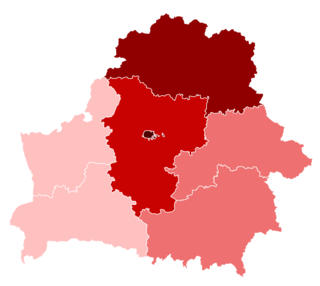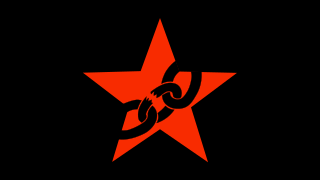
Veyshnoria is a fictional state created for Zapad 2017, a joint Russo–Belarusian military training exercise. It neighbors Belarus and is an enemy of the Union State. Veyshnoria occupies most of the Grodno Region and the northwestern parts of the Minsk and Vitebsk regions.

The COVID-19 pandemic in Belarus was a part of the ongoing worldwide pandemic of coronavirus disease 2019 caused by severe acute respiratory syndrome coronavirus 2. The virus was confirmed to have spread to Belarus, when the first case of COVID-19 in the country was registered in Minsk on 28 February 2020. As of 29 January 2023, a total of 19,047,714 vaccine doses have been administered.

Grodno Azot is an open joint-stock company, Belarusian state-run producer of nitrogen compounds and fertilizers located in Grodno, Belarus.

Revolutionary Action is a Belarusian organization of anarcho-communists. It is the oldest active anarchist organization in Belarus.

The 2022 Belarusian constitutional referendum was held in Belarus on 27 February 2022.
Aliaksandr Shakutsin is a Belarusian businessman, allegedly close to Belarusian president Alexander Lukashenko. Media widely characterize Shakutsin as an oligarch. On 17 December 2020, the Council of the European Union imposed sanctions on him.

Cyber Partisans is a Belarusian decentralized anonymous activist/hacktivist collective emerged in September 2020, known for its various cyber attacks against the authoritarian Belarusian government. The group is part of the broader Belarusian opposition movement.

Belarus Solidarity Foundation BYSOL is a non-profit organization established on August 14, 2020, as a response to violence that happened in Belarus after the 2020 Belarusian presidential election. BYSOL is aimed at raising funds to provide financial aid to victims of repression in Belarus.

Belarus, a close ally of Russia, has supported its eastern neighbour in the 2022 Russian invasion of Ukraine. Before the start of the offensive, Belarus allowed the Russian Armed Forces to perform weeks-long military drills on its territory; however, the Russian troops did not exit the country after they were supposed to finish. Belarus allowed Russia to stage part of the invasion from its territory, giving Russia the shortest possible land route to Ukraine's capital, Kyiv. However, these forces withdrew within two months, thus ceasing land-based military operations originating from Belarus and resulting in the recapture of the Ukrainian side of the border region by Ukraine. Despite this, the situation along the border remains tense, with Ukraine closing the border checkpoints leading into Belarus, bar special cases.

"And now I will show you, where they were preparing the attack on Belarus from" is a phrase widely spread on russophone internet communities said by Alexander Lukashenko, which attempts to justify Russia's invasion of Ukraine in regards to Belarus. The phrase subsequently became very popular in many countries of the former Soviet Union and started being used as a meme in various videos from mid-March 2022.

The Russian occupation of Zhytomyr Oblast was a military occupation that began on 26 February 2022, 2 days after Russia invaded Ukraine. The capital, Zhytomyr was never captured and was bombed in the 2022 Zhytomyr attacks. Small towns and settlements were however captured, in the north-west and north-central Korosten Raion, near the border with Kyiv Oblast.

The Combat Organization of Anarcho-Communists is a militant anarcho-communist organization in Eastern Europe, part of the Belarusian and Russian partisan movement. It aims for social revolution and a libertarian socialist society. Since the start of the 2022 Russian invasion of Ukraine, it has sabotaged railway infrastructure in Russia and Belarus, as well as attacking Russian military commissariats and telecommunications. According to The Insider, the group has become "the most active 'subversive' force" in Russia since the war began.

A series of Molotov cocktail arson attacks and shootings have taken place in Russian military commissariat registration and enlistment offices since the start of the country's invasion of Ukraine in 2022. Other governmental buildings have also been attacked in multiple regions of Russia. Part of the Russian partisan and anti-war movements, the attacks were spurred by several factors, including the outbreak of the invasion of Ukraine, the deployment of Russian conscripts to the front line, the start of spring conscription, and rumors about possible mobilization in the country, which were later found to be true. Commissariat offices recruit servicemen to the Russian Army and choose who is eligible and ineligible for service. The attacks are not a single coordinated campaign; behind them are a variety of people, from left-wing anarchists and scammers to far-right groups and assorted lone wolf actors.

Partisan movements emerged in Belarus and Russia following the 2022 Russian invasion of Ukraine. These resistance movements act against the governments of Alexander Lukashenko in Belarus and Vladimir Putin in Russia. Elements of the opposition also work to counter the interests of the armed forces of both countries, as well as against civilian supporters of these authorities, in order to put a stop to the war in Ukraine.

Stop the Wagons is a Russian anti-war movement that engaged in sabotaging Russian railways in various ways to prevent the transport of equipment, fuel, ammunition and other supplies to the war in Ukraine.

The Association of Security Forces of Belarus, also known as BYPOL is a Belarusian organization that was created by former employees of law enforcement agencies to counter the Belarusian authorities. The association has channels on YouTube and Telegram, on which it publishes various videos related to the security forces, and also doxes law enforcement officers.

Community of Railway Workers of Belarus is a Belarusian opposition initiative of railway workers, recognized by the Belarusian authorities as an extremist formation.
The rail war began in different regions of Russia in the spring of 2022 after a similar rail war in Belarus.

Busly liaciać is a Belarusian opposition resistance group founded on 13 November 2020 and fighting against the Alexander Lukashenko government. Included together with the Cyber Partisans in the association "Supraciŭ"
The Belarusian partisan movement is an ongoing campaign of resistance against the authoritarian regime of Alexander Lukashenko. It began in response to the violent suppression of the 2020–2021 Belarusian protests. The partisans aim to depose Lukashenko's government and expel Russian troops from Belarus.
















